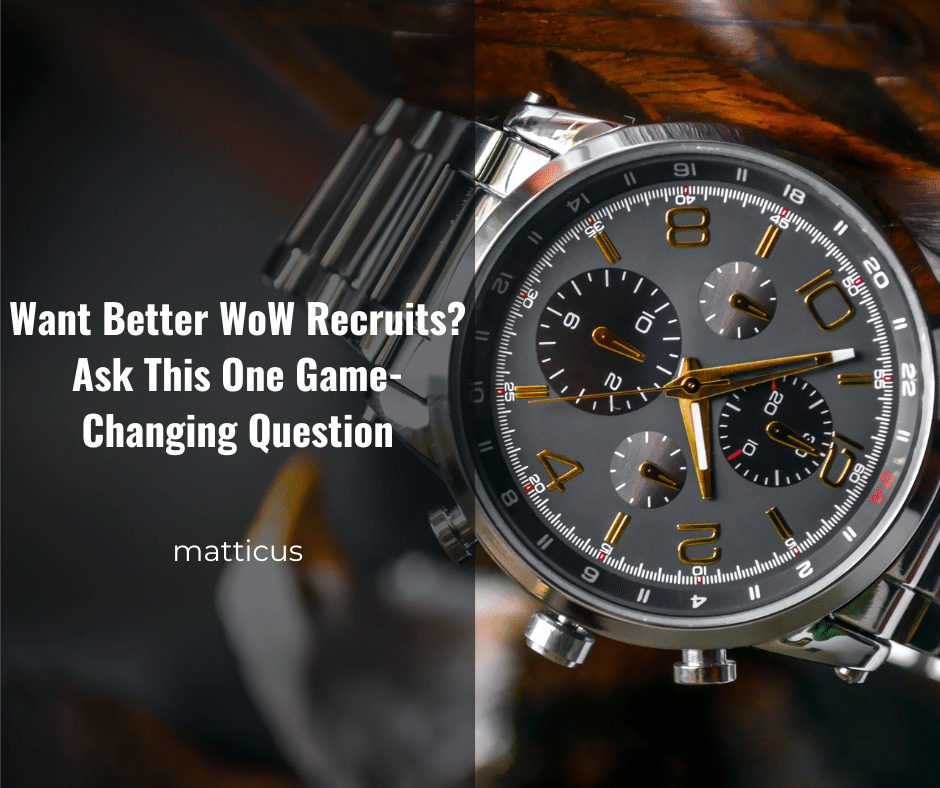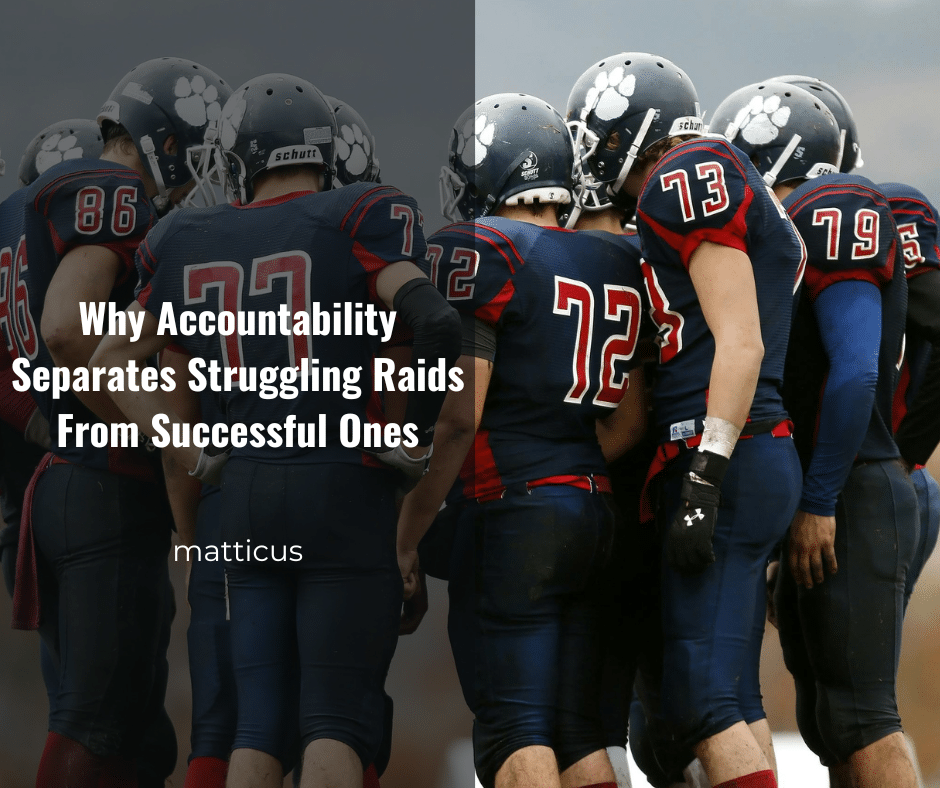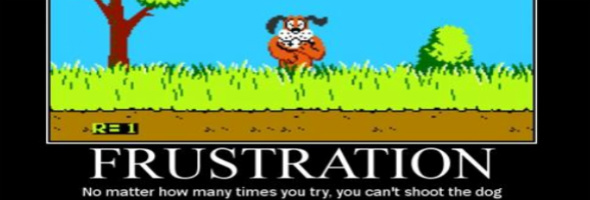As a long time avid follower of as many guild/raid leadership blogs and forums as I can fit into my schedule each week, there is one discussion topic that almost invariably makes me wince. Actually, that isn’t exactly accurate. There is one particular response to this particular topic that makes me want to punch something.
“How do I push my current guild to a higher or more serious level of progression?”
The response that inevitably pops up that makes me /facepalm IRL is: “You need to start replacing the bads and attracting the pros” or even worse (because it sounds so much more friendly somehow) “You need to explain to everyone that raid spots are competitive and people will be replaced as soon as something ‘better’ becomes available”
The overwhelming message that gets passed along whenever this topic comes out is a very clear mercenary-like outline that clearly advocates using fear of being kicked or replaced to snap your raiders into line and light a fire under them to keep them moving forward under the imminent risk of being replaced.
This is my public response to all advocates of raid management that involves any sort of emphasis on kicking or replacing people as soon as something better comes along: Eff that, you would never find me in a guild that treats its members like that. Unless you believe that you are seriously intent on competing for World or US progression rankings, using an approach that emphasizes the action of replacing/removing people is an inherently unstable strategy.
I once posted that I believe sports analogies are by far the best way to view leading a raid or guild, as opposed to trying to compare it to running a business or a leading a group of soldiers. I bring this up because something that always pops into my mind when people start trying to describe their plans for assembling the “Dream Team” of WoW raiding, it makes me remember how well it has worked long term when the U.S. did the same thing with our national basketball team.

Sure, the U.S. national basketball team has been more or less successful in the long term, but the only reason for our success has been the overwhelming pool of talent that we have to pull from in the NBA. If you watch the games, the level of coordination and teamsmanship just doesn’t ever really manifest itself on the court, especially in the first couple of incarnations of the team. Essentially it is a collection of basketball gods steamrolling over the competition through the sheer force of individual talent. How much fun could that be on a long term basis to be part of? The only hope someone like me would have of answering how fun that might be would be to look at what kind of turnover the team has had since the first “Dream Team” (for those that don’t want to go look, essentially the turnover is nearly 100% between each big game until very recently when they instituted rules to try and force players to commit to more time to the team).
On the other hand, we could look at virtually every Hollywood sports movie ever made for a good counterexample of an underdog team that overcomes enormous odds through hard work and awesome teamwork. My personal favorite for this analogy is “Miracle” by Disney,<link: a true story based coincidently on another U.S. Olympic team. The 1980 U.S. hockey team and their “Miracle on Ice.” It is a great movie if you’re into feel-good sports films, especially if you appreciate the ones based on real life stories. I remember watching the final game between this team and the Russians on TV and the swell of national pride during those final seconds of the game. It isn’t hard to imagine why this is described as one of the greatest moments in sports history.
So what is the point? I’ll make an effort here to explain what it is exactly that goes through my head when I see this discussion pop up and my reaction when someone proposes trying to go the mercenary route in their approach to building a “successful” raid group. It usually centers around two questions:
Does this person honestly ever see themselves trying to break into the world progression rankings with their team? (Hint: if you are asking on a public forum for directions or help on how to motivate your team to do better, the answer is no) I know that at least for me, the only measure of success I have for my raid team is whether or not we meet our raid goals each tier. I could care less if we are the 3rd raid group to do so or the 30,000th in the world, as long as we meet our own goals I am going to feel like we succeeded.
Then my mind goes on a rambling tangent involving sports analogies and nostalgia and I come to my second question:
Which Olympic winning sports team do I honestly think I would rather be a member of? And perhaps more importantly, which team would the person asking the question rather pbe a part of? The U.S. National basketball team a.k.a. the “Dream Team” that get together every 4 years to ROFLStomp the rest of the world in basketball (and no, you don’t get an NBA contract or salary for being on the team) or would I/they want to be part of that “rag-tag group of college kids” who pulled off one of the greatest moments in sports history? I suppose both options are going to appeal to people in different ways.
Another thing to consider: From everything I have ever read about really high end raiding guilds, one of the most prevalent traits that they share is that the bulk of their members have been playing together for -years-. Not a single one of them is stressed out over whether or not the next new applicant is going to cause them to take their raid spot and the turnover these teams have is extremely low. Turnover for them has been extremely low for -years-, and I would guess that what turnover they had had nothing to do with someone failing to perform up to the group’s expectations but instead likely had to do with real life obligations that had nothing to do with the game.
If you don’t have the raw talent to be ROFLStomping your way through the content, then employing a revolving door strategy where you are constantly trying to replace your “worst” raiders is going to result in a turnover rate that will rival your local fast food joint with the creepy shift manager.
If your stated goal is to replace the lowest performing members of your raid team on a regular basis, what kind of message does that send to your team about the long term security of their raid spots? Even more importantly, what does that say about the possibility of being replaced by some raiding super-star who happens to apply to the guild?
Next week I will share my alternatives to the idea of motivating your raiders through fear of being replaced. In the meantime I would like to leave everyone with a question to ponder. You are welcome to share your answers below in the comments, but I would be just as happy if you just spend a few minutes thinking about what your answer would be.
Question: If one of the world’s best <insert class/role here> players applied to your guild, assuming that they met all of your other requirements for a new recruit, which of your current players would you replace with the new applicant? What if the person being replaced was already one of your stronger players? Would your answer be any different if there were 4 of the world’s top players turning in applications at the same time? How about 9 applications that are clearly head and shoulders better than anything you currently have in your raid?
I can tell you that I at least would almost undoubtedly turn the applicant down. Unless they happened to stumble into one of the few periods of the year where we have opened recruitment. Though to be honest, even then I would have to seriously question whether someone like that would really fit in with our raid group.




